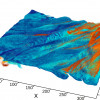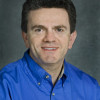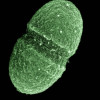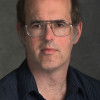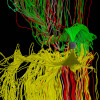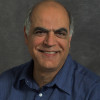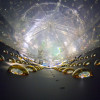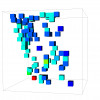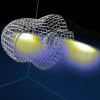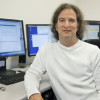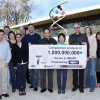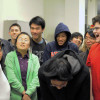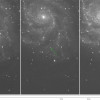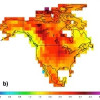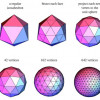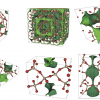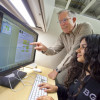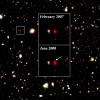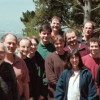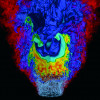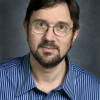News Center
Sifting Through a Trillion Electrons
Using tools developed by Berkeley Lab Computational Research, astrophyscists were able to mine a trillion-particle 3D magnetic reconnection dataset in about three seconds, and visualize the results for analysis. Each time-step of this simulation is a massive 32 terabyte file, this is the first time a dataset of this magnitude has been queried and visualized so quickly. Read More »
Erich Strohmaier and the TOP500: A list that’s taken on a life of its own
In June 2012, Erich Strohmaier will present the 39th edition of the TOP500 list during the opening session of the International Supercomputing Conference in Hamburg, Germany. This profile tracks the beginning of the list and Strohmaier's career. Read More »
Berkeley Lab Scientists Help Define the Healthy Human Microbiome
The human microbiome’s exact function, good and bad, is poorly understood. But that could all change now that the normal microbial make-up of healthy humans has been mapped for the first time with help from Berkeley Lab's Computational Sciences Division. Read More »
Hank Childs Wins 2012 DOE Early Career Award
Hank Childs of the Computational Research Division’s Visualization Group has been honored with a 2012 Department of Energy Early Career Award. Read More »
John Bell Elected to National Academy of Sciences
John Bell, an applied mathematician and computational scientist who leads the Center for Computational Sciences and Engineering at Lawrence Berkeley National Laboratory, has been elected to the National Academy of Sciences. Read More »
Visualizing Processes That Lead to “Cracks” in the Earth’s Cocoon
Earth is mostly protected from solar radiation, by the magnetosphere. But sometimes the magnetosphere “cracks,” allowing radiation to seep in and wreak havoc on power grids and satellites. This phenomenon is not well understood, so scientists from UC San Diego ran simulations to investigate what happens. In the process, they generated approximately 3 petabytes of data, and reached out to Berkeley Lab’s Burlen Loring to develop customized visualization techniques for analyzing data. Read More »
Berkeley Lab-led Institute to Help Solve Data-intensive Science Challenges
Energy Secretary Steven Chu announced a $25 million five-year initiative to help scientists better extract insights from today’s increasingly massive research datasets, the Scalable Data Management, Analysis, and Visualization (SDAV) Institute. SDAV will be funded through DOE’s Scientific Discovery through Advanced Computing (SciDAC) program and led by Arie Shoshani of Lawrence Berkeley National Laboratory (Berkeley Lab). Read More »
Researchers Discover a New Kind of Neutrino Transformation
Some unprecedentedly precise measurements from the Daya Bay Neutrino Experiment are revealing how electron antineutrinos “oscillate” into different flavors as they travel. This finding may eventually solve the riddle of why there is far more ordinary matter than antimatter in the universe today. Read More »
Carbon Dioxide Catchers
CRD's Maciej Haranczyk and colleagues have developed a computational tool that can help researchers sort through vast databases of porous materials to identify promising carbon capture candidates—and at record speeds. They call it Zeo++.
Read More »
John Shalf's Paper is Among the Best in History of HPDC Conference
“The Cactus Code: A Problem Solving Environment for the Grid,” a paper co-authored by John Shalf of the Computational Research Division, has been selected as one of the top papers in the 20 years of publications from HPDC, the International ACM Symposium on High-Performance Parallel and Distributed Computing (HPDC). Read More »
Berkeley Lab Mathematicians Win Cozzarelli Prize
James Sethian and Robert Saye, mathematicians who both hold joint appointments with the Lawrence Berkeley National Laboratory (Berkeley Lab) and the University of California (UC) Berkeley, have won the 2011 Cozzarelli Prize for the best scientific paper in the category of Engineering and Applied Sciences. Read More »
Breaking Ground on the Computational Research and Theory Facility
Energy Secretary Steven Chu, along with Berkeley Lab and UC leaders, broke ground on the Lab’s Computational Research and Theory (CRT) facility, Wednesday, Feb. 1. The CRT will be at the forefront of high-performance supercomputing research and be DOE’s most efficient facility of its kind. Read More »
Billions of Genes and Counting!
Developed by CRD's Biological Data Management & Technology Center, the IMG/M data management system, which supports the analysis of microbial communities sequenced by the Joint Genome Institute, crossed the boundry of 1 billion genes recorded in the system—more than any other similar system in the world. Read More »
Inspiring Careers in Science Research
In an effort to expose high school students to careers in science research, the Lawrence Berkeley National Laboratory’s (Berkeley Lab) Computing Sciences Diversity Outreach Program partnered with San Francisco’s Lowell High School research program. Read More »
Closest Type Ia Supernova in Decades Solves a Cosmic Mystery
Even as the "supernova of a generation" came into view in backyards across the northern hemisphere last August, physicists and astronomers who had caught its earliest moments were developing a surprising and much clearer picture of what happens during a titanic Type Ia explosion. Now they have announced the closest, most detailed look ever at one of the universe’s brightest “standard candles,” the celestial mileposts that led to the discovery of dark energy. Read More »
A Better Way to ID Extreme Weather Events in Climate Models
A team of researchers that includes Berkeley Lab scientists are using state-of-the-art methods in data mining and high-performance computing to quantify extreme weather phenomena in the very large datasets generated by today’s climate models. Their work will help scientists predict how climate change impact the frequency of extreme weather events. Read More »
Today’s Severe Drought, Tomorrow’s Normal
While the worst drought since the Dust Bowl of the 1930s grips Oklahoma and Texas, scientists are warning that what we consider severe drought conditions in North America today may be normal for the continent by the mid-21st century, due to a warming planet. Read More »
Supercomputers Take a Cue from Microwave Ovens
To build the break-through supercomputers that climate researchers need to model clouds, scientists are taking a cue from consumer electronics where everything from chips to batteries to software is optimized to the device’s application. Read More »
Computing Tools Speed Search for New Porous Materials
A team of Berkeley Lab and the UC Berkeley researchers are speeding the search for new porous materials through computation. Read More »
Experimental Mathematics: Computing Power Leads to Insights
Modern computer technology has vastly expanded our ability to discover new mathematical results. Read More »
Distant Supernovae Reveal 10 Billion Year-old Secret
Type Ia supernova were five times more frequent in the early universe than today, found astronomers who exposed the largest sample of distant supernovae ever found. Many of the 150 events are 10 billion light years distant from Earth. Read More »
Nobel Laureate a Computational Cosmology Pioneer
Winner of the 2011 Nobel Prize in Physics, Saul Perlmutter leads a research team believed to be the first to use supercomputers to analyze and validate observational data in cosmology. Read More »
Co-Designing Exascale Architectures and Algorithms for Real-World Combustion Simulations
In a five-year project recently announced by the Department of Energy, the Combustion Exascale Co-Design Center will combine the talents of combustion scientists, mathematicians, computer scientists, and hardware architects. This multidisciplinary team will work to simultaneously redesign each aspect of the combustion simulation process—from algorithms to programming models to hardware architecture—in order to create high fidelity combustion simulations that can run at the next level of supercomputing power, the exascale. Read More »
Supernova Caught in the Act
Astronomers believe they caught a nearby supernova within hours of its explosion, a rare feat made possible by a specialized survey telescope and state-of-the-art computational tools. Read More »
Vern Paxson Honored
Vern Paxson of Berkeley Lab’s Computational Research Division has been named recipient of this year’s ACM SIGCOMM Award. Read More »









